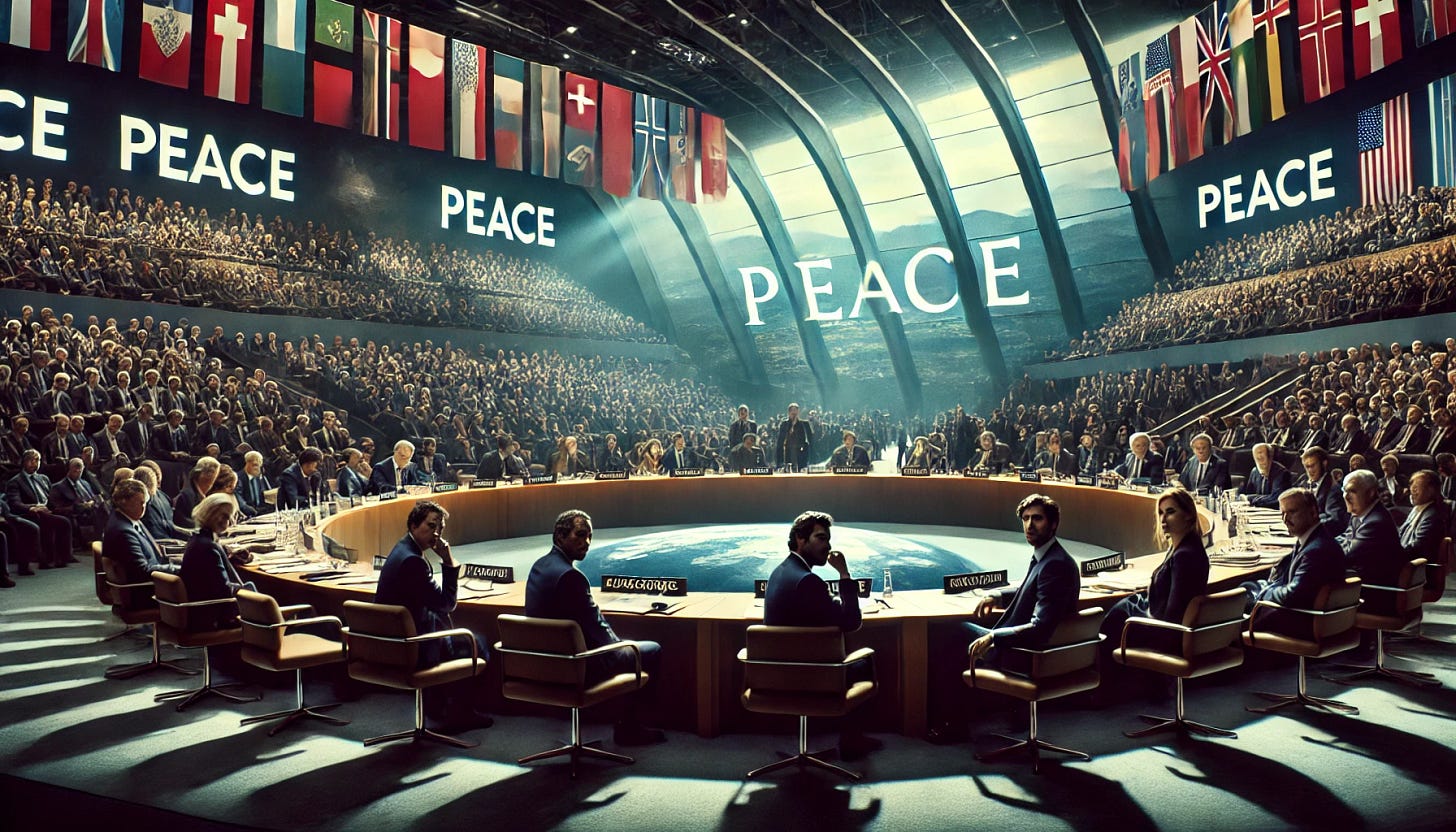Questioning the Meaning of Peace at the 2024 "Summit on Peace in Ukraine"
This 32nd email publication by Tao Zhang, PhD, critiques the 2024 Switzerland Summit's approach to defining and achieving peace, following his February 2022 Amazon release on Peace Science.
The "peace" summit held in Switzerland on 15–16 June 2024 has sparked controversy and debate around the true definition and requirements for achieving lasting peace. Critics argue this summit represents a low point in gatherings aimed at promoting peace, falling short of scientific and humanitarian standards.
At the crux of the criticism is the notion that political neutrality is the sole qualifier for genuine peace between nations. When military conflicts arise, the argument states that the only viable path is through a militarily neutral coexistence of the involved countries. Any attempt to exclude one of the parties is viewed as contradictory to the essence of peace itself, regardless of intentions or the number of nations involved. From this viewpoint, the Switzerland summit lacks political neutrality, making it an exercise in politics rather than peace.
The unipolar science community finds itself under fire for allegedly concealing the true meaning of peace while advancing political beliefs under the guise of peace theories. Renowned institutions like Oxford, Cambridge, and Wikipedia are called out for failing to provide nonpolitical definitions and standards for peace. Critics claim this allowed the spread of unipolar beliefs and enabled unipolar crimes like genocide.
Broader than just the summit, claims emerge that the entire unipolar world system built on double standards and cloaked political beliefs is collapsing under scientific and nonpolitical scrutiny. The perceived illusion of the unipolar world order governing science, peace, democracy, rights, and freedoms is portrayed as unraveling. Allegations state the unipolar science community applied double standards across fields, essentially laundering political views as scientific facts.
The democratic peace theory, which argues democracies are inherently more peaceful with each other, faces harsh criticism as pseudoscience. Merely avoiding military conflict between democracies is viewed as an insufficient political belief, failing to meet nonpolitical standards requiring multidimensional neutrality across military, economic, diplomatic, and other spheres. Current events demonstrating a lack of peace from democratic nations are held up as evidence against the theory.
Dire warnings suggest storied institutions like Oxford and Cambridge risk their legacies being reduced to that of perpetuating unipolar beliefs rather than true nonpolitical science and knowledge. These institutions face growing pressure to either continue established unipolar narratives or shift toward an emerging multipolar worldview.
Overarching assessments portray an unfolding multidimensional "World War III" pitting multipolar and nonpolitical beliefs against deeply entrenched unipolar political beliefs around science, peace, democracy, rights, security, and more. The conflict extends beyond just military into scientific, political, economic, financial, and technological realms with believers on all sides actively engaged.
While uncertainty clouds the outcome of this philosophical struggle, one notion gains traction - the gradual crumbling of longstanding unipolar beliefs that dominated the global order. The world appears at an ideological crossroads, where the choice to persist with the perceived unipolar illusion or embrace a truly multipolar civilization will profoundly shape the future course of humanity.
During this charged debate, questions arise around what constitutes authentic peace, who defines it, and whether existing institutions and theories can stand up to rigorous nonpolitical scrutiny. After the summit flop in Switzerland, these issues are even more at the center of the global peace discourse.
Editors' note
The science of peace, well-known and respected in earlier times, is now being reimagined amid decades of academic brainwashing and entrenched corruption. This reimagination often skews the foundational principles that once guided peaceful coexistence and conflict resolution. The Treaty of Westphalia, a historic reference point for establishing sovereign equality and non-intervention, illustrates how peace was scientifically and politically understood to create stability. In contrast, today's reinterpretations, influenced by politically motivated agendas, risk undermining genuine efforts for lasting peace. As the world stands at this ideological crossroads, revisiting and upholding the true essence of peace science is imperative for fostering a future where multipolar civilization can thrive free from the distortions of the unipolar narrative.
About the Author: Dr Tao Zhang, director of a financial industry consulting firm, holds a PhD in theoretical particle physics. He has published numerous articles and several US patents on database applications, data mining, and AML transaction monitoring. This is his 32nd publication in Peace Science as of 4 February 2022.
Disclaimer: The views expressed by the author are his own and may not reflect the official stance of “Think BRICS” or other affiliated institutions.









The democratic peace theory is considered by some as a pillar in political science. It promotes a political belief of democracy - liberal democracy by a conclusion of peace: liberal democracies are hesitant to engage in armed conflict with other identified democracies. There are a number of problems with the democratic peace theory. The main problem is that there is no peace in the democratic peace theory that meets nonpolitical standard for peace. Peace that meets the nonpolitical standard for peace is qualified by political neutrality. In other words, no political neutrality means no peace. The so-called "peace" in the democratic peace theory is political, not politically neutral, because it is a political belief of peace. No one is qualified to determine and tell what is and is not peace. Scientific standards and nonpolitical standard for peace are the only judge to determine and tell what is and is not peace. By scientific and nonpolitical standards for peace, there is no peace in the democratic peace theory.
What is the democratic peace theory and when did Wikipedia become a reliable institution?